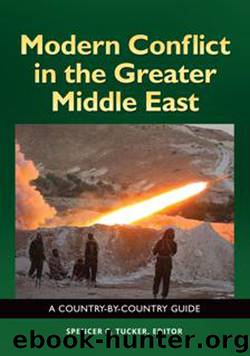Modern Conflict in the Greater Middle East by Spencer C. Tucker

Author:Spencer C. Tucker
Language: eng
Format: epub
ISBN: 9781440843617
Publisher: ABC-CLIO
Colonel Muammar Gaddafi, shown here in 1970. Gaddafi held power in Libya from 1969 until the Libyan Revolution (Libyan Civil War) of 2011, when he was overthrown and killed. (AP Photo)
Oddly perhaps, Gaddafi’s regime generally refrained from perpetrating violent repression at home, and the dictator publicly condemned torture. Those accused of torture could receive lengthy prison sentences. Gaddafi was far more willing to engineer violent acts outside Libya, however. Always an enemy of Zionism, he supported Yasser Arafat’s Fatah faction of the Palestine Liberation Organization and sponsored terrorist attacks against Israel and related Western targets. As the 1970s progressed, Gaddafi voiced his support for revolutionary movements around the world, and Libya played host to a number of insurgent groups. Gaddafi also sought to build up the Libyan military and pursued significant arms purchases from France and the Soviet Union after 1970. However, his suspicion of the atheist dimension of communism kept Libya out of the Soviet orbit in the strict sense. Nevertheless, his anti-Western activities assured him of Soviet support.
Internally, Gaddafi sought to remake Libyan society, insisting that a mixture of socialism and Islam would ensure social justice. He created a welfare state buttressed by oil revenues and reformed the legal system to include elements of sharia (Islamic law). Gaddafi’s Green Book (1976) laid out his political philosophy. In it he rejected representative government in favor of direct democracy. In 1977, he set up Basic People’s Congresses across the nation but still retained real power himself. Finally, Gaddafi transformed Libya’s oil industry by taking production away from international oil companies, setting a pattern that would be imitated by other oil-rich states.
Despite Gaddafi’s radical politics, Libya and the United States avoided direct confrontation for much of the 1970s because of their economic relationship. This changed when Libya vehemently opposed Egyptian-Israeli peace negotiations. Gaddafi viewed any Arab rapprochement with Israel as a betrayal. In 1977, the Jimmy Carter administration listed Libya, Cuba, and North Korea as states that supported international terrorism.
U.S.-Libyan relations continued to sour. On December 2, 1979, rioters targeted the U.S. embassy in Tripoli in imitation of the attack on the American embassy in Tehran earlier that year. As a result, in May 1980 the United States withdrew its diplomatic personnel from Libya.
With the election of President Ronald Reagan in 1980, relations between the United States and Libya chilled further. On May 6, 1981, Reagan officially labeled Libya as a state supporter of terrorism and expelled Libyan diplomats from the United States. The administration also pursued a freedom of navigation policy and challenged Libya’s 1973 claims of sovereignty over the Gulf of Sidra in the Mediterranean. On July 19, 1981, the Nimitz carrier battle group was patrolling near the Gulf of Sidra when two of the carrier’s fighters were approached and attacked by two Libyan fighters. The American aircraft evaded the attack and shot down both Libyan planes.
Tensions increased further, and in March 1982 the United States banned the import of Libyan oil. The sanctions had only limited effect, as European nations did not adopt U.
Download
This site does not store any files on its server. We only index and link to content provided by other sites. Please contact the content providers to delete copyright contents if any and email us, we'll remove relevant links or contents immediately.
| Africa | Americas |
| Arctic & Antarctica | Asia |
| Australia & Oceania | Europe |
| Middle East | Russia |
| United States | World |
| Ancient Civilizations | Military |
| Historical Study & Educational Resources |
Goodbye Paradise(3810)
Men at Arms by Terry Pratchett(2838)
Tobruk by Peter Fitzsimons(2518)
Borders by unknow(2315)
Arabs by Eugene Rogan(2299)
Pirate Alley by Terry McKnight(2221)
More Than Words (Sweet Lady Kisses) by Helen West(1867)
Belonging by Unknown(1857)
It's Our Turn to Eat by Michela Wrong(1731)
The Biafra Story by Frederick Forsyth(1656)
The Source by James A. Michener(1613)
Botswana--Culture Smart! by Michael Main(1602)
Coffee: From Bean to Barista by Robert W. Thurston(1545)
A Winter in Arabia by Freya Stark(1538)
Gandhi by Ramachandra Guha(1532)
The Falls by Unknown(1527)
Livingstone by Tim Jeal(1489)
The Shield and The Sword by Ernle Bradford(1409)
Africa: Altered States, Ordinary Miracles by Richard Dowden(1385)
